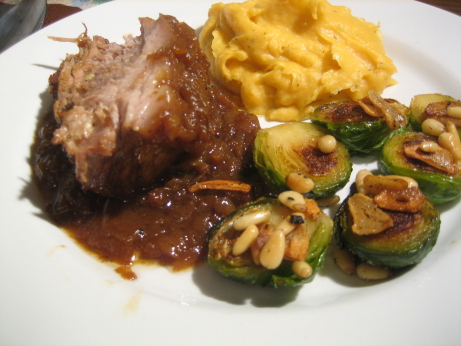I love to braise. It’s almost worth suffering through the interminable and bitter winter of Montreal to do it. Of course you could braise all year round if you really wanted to, but somehow simmering meat for hours in the middle of July just doesn’t sound like a good idea. Braised meats are delicious, so I’ve tried letting someone in the kitchen at a restaurant suffer through the heat, and ordered it. Unfortunately it’s just too heavy to be enjoyable, and the process of doing it myself is one of my favourite parts. You really need a miserably blustery day to truly appreciate the joys of a good braise. I love the side benefits of the whole house smelling wonderful for a day, and the comforting knowledge that dinner is getting itself ready, and the more you ignore it the better it will be. With our oil heating, leaving the stove on is also a pretty economical way to heat the house.
You can’t beat a braise for thrift either. You can keep your precious tenderloins, give me the gnarliest, toughest, and cheapest cut of meat you can find, and it will turn to gold after a few hours with Le Creuset. It’s amazing to see this awful slab of meat transformed. The fat renders, and gets skimmed away, the connective tissue dissolves and become that elixir of mouth-feel, gelatin, and even the toughest cuts yeild to a fork. Those braising bits have so much more flavour than the quick searing cuts of meat, it just takes a little time to coax it out.
This recipe starts with a skin-on picnic ham. You score the skin, and insert cloves of garlic into the meat, add salt and pepper, and then brown it thoroughly in a heavy pot (cast iron is your friend). Once the meat is browned, you remove it, and sauté a whole whack of onions in the pot. When the onions turn golden, you add unfiltered apple cider, and the meat back to the pot. Then you seal it up, stick it in a 325 oven, and walk away for the next three hours or so. When you’re ready to serve, you remove the meat, and reduce the braising liquid to two cups. If the lid of your pot doesn’t have an extremely tight seal this will have happened naturally.
You can serve the pork right away, but it’ll taste better if you let it cool in the braising liquid, refrigerate it overnight, and then serve it for dinner the following day. This also makes defatting the sauce easy. The recipe doesn’t call for it, but I think it’s a necessary step. There’s a huge amount of fat on a pork shoulder, and most of it melts into the sauce. Even if you don’t have time to cool it it’s worth letting the liquid sit, and skimming part of the fat away. That’s one of the recipe’s biggest weaknesses. I defatted my sauce, but I don’t think I would have enjoyed it nearly as much if I’d followed the recipe exactly.
Recipes are never very specific about how much you should brown meat for a braise. Older books spout that nonsense about sealing in flavour, but really you’re building flavour. The darker the meat gets, without burning, the more flavourful your braise will turn out. There’s nothing at all wrong with your browned meat looking more than a little black, just avoid billowing clouds of smoke.
Braised pork shoulders are always good, it’s nearly impossible to mess a recipe like this up. This particular braise was minimalist, with just a few ingredients. I think it could have easily accommodated another flavour, a sprig of thyme would have done wonders. It was also a little unbalanced, both the onions and the cider were very sweet, and a little vinegar would have been welcome. The texture was excellent, succulent and falling apart, with a thick hearty sauce to go along with he meat. It made quite a nice dinner, but it was an outrageously good sandwich the following day.
The recipe’s biggest weakness was the skipping of the defatting step, other than that I have only minor quibbles. If you’re OK with sweeter meat dishes, leave it as is, if not go with some cider vinegar. I’d add herbs depending on my mood, it’s very nice even without them. If you don’t braise a lot, this recipe is certainly worth trying. And, if not this recipe, then some recipe, get out there and eat low on the hog.
